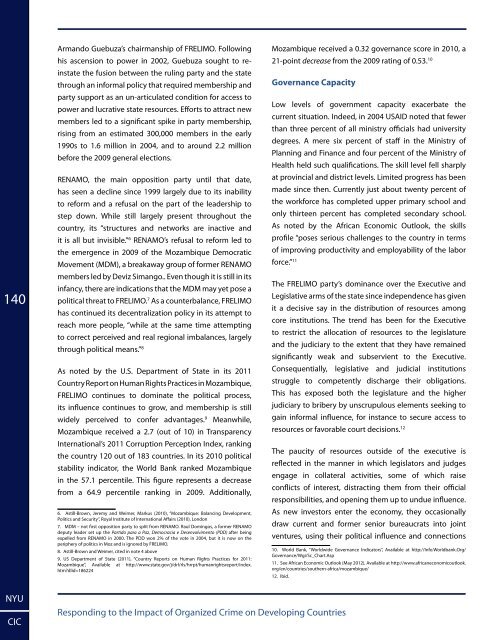here - Center on International Cooperation - New York University
here - Center on International Cooperation - New York University
here - Center on International Cooperation - New York University
You also want an ePaper? Increase the reach of your titles
YUMPU automatically turns print PDFs into web optimized ePapers that Google loves.
140<br />
Armando Guebuza’s chairmanship of FRELIMO. Following<br />
his ascensi<strong>on</strong> to power in 2002, Guebuza sought to reinstate<br />
the fusi<strong>on</strong> between the ruling party and the state<br />
through an informal policy that required membership and<br />
party support as an un-articulated c<strong>on</strong>diti<strong>on</strong> for access to<br />
power and lucrative state resources. Efforts to attract new<br />
members led to a significant spike in party membership,<br />
rising from an estimated 300,000 members in the early<br />
1990s to 1.6 milli<strong>on</strong> in 2004, and to around 2.2 milli<strong>on</strong><br />
before the 2009 general electi<strong>on</strong>s.<br />
RENAMO, the main oppositi<strong>on</strong> party until that date,<br />
has seen a decline since 1999 largely due to its inability<br />
to reform and a refusal <strong>on</strong> the part of the leadership to<br />
step down. While still largely present throughout the<br />
country, its “structures and networks are inactive and<br />
it is all but invisible.” 6 RENAMO’s refusal to reform led to<br />
the emergence in 2009 of the Mozambique Democratic<br />
Movement (MDM), a breakaway group of former RENAMO<br />
members led by Deviz Simango.. Even though it is still in its<br />
infancy, t<str<strong>on</strong>g>here</str<strong>on</strong>g> are indicati<strong>on</strong>s that the MDM may yet pose a<br />
political threat to FRELIMO. 7 As a counterbalance, FRELIMO<br />
has c<strong>on</strong>tinued its decentralizati<strong>on</strong> policy in its attempt to<br />
reach more people, “while at the same time attempting<br />
to correct perceived and real regi<strong>on</strong>al imbalances, largely<br />
through political means.” 8<br />
As noted by the U.S. Department of State in its 2011<br />
Country Report <strong>on</strong> Human Rights Practices in Mozambique,<br />
FRELIMO c<strong>on</strong>tinues to dominate the political process,<br />
its influence c<strong>on</strong>tinues to grow, and membership is still<br />
widely perceived to c<strong>on</strong>fer advantages. 9 Meanwhile,<br />
Mozambique received a 2.7 (out of 10) in Transparency<br />
Internati<strong>on</strong>al’s 2011 Corrupti<strong>on</strong> Percepti<strong>on</strong> Index, ranking<br />
the country 120 out of 183 countries. In its 2010 political<br />
stability indicator, the World Bank ranked Mozambique<br />
in the 57.1 percentile. This figure represents a decrease<br />
from a 64.9 percentile ranking in 2009. Additi<strong>on</strong>ally,<br />
6. Astill-Brown, Jeremy and Weimer, Markus (2010), “Mozambique: Balancing Development,<br />
Politics and Security”, Royal Institute of Internati<strong>on</strong>al Affairs (2010), L<strong>on</strong>d<strong>on</strong><br />
7. MDM – not first oppositi<strong>on</strong> party to split from RENAMO. Raul Domingos, a former RENAMO<br />
deputy leader set up the Partido para a Paz, Democracia e Desenvolvimento (PDD) after being<br />
expelled from RENAMO in 2000. The PDD w<strong>on</strong> 2% of the vote in 2004, but it is now <strong>on</strong> the<br />
periphery of politics in Moz and is ignored by FRELIMO.<br />
8. Astill-Brown and Weimer, cited in note 4 above<br />
9. US Department of State (2011), “Country Reports <strong>on</strong> Human Rights Practices for 2011:<br />
Mozambique”, Available at http://www.state.gov/j/drl/rls/hrrpt/humanrightsreport/index.<br />
htm?dlid=186224<br />
Mozambique received a 0.32 governance score in 2010, a<br />
21-point decrease from the 2009 rating of 0.53. 10<br />
Governance Capacity<br />
Low levels of government capacity exacerbate the<br />
current situati<strong>on</strong>. Indeed, in 2004 USAID noted that fewer<br />
than three percent of all ministry officials had university<br />
degrees. A mere six percent of staff in the Ministry of<br />
Planning and Finance and four percent of the Ministry of<br />
Health held such qualificati<strong>on</strong>s. The skill level fell sharply<br />
at provincial and district levels. Limited progress has been<br />
made since then. Currently just about twenty percent of<br />
the workforce has completed upper primary school and<br />
<strong>on</strong>ly thirteen percent has completed sec<strong>on</strong>dary school.<br />
As noted by the African Ec<strong>on</strong>omic Outlook, the skills<br />
profile “poses serious challenges to the country in terms<br />
of improving productivity and employability of the labor<br />
force.” 11<br />
The FRELIMO party’s dominance over the Executive and<br />
Legislative arms of the state since independence has given<br />
it a decisive say in the distributi<strong>on</strong> of resources am<strong>on</strong>g<br />
core instituti<strong>on</strong>s. The trend has been for the Executive<br />
to restrict the allocati<strong>on</strong> of resources to the legislature<br />
and the judiciary to the extent that they have remained<br />
significantly weak and subservient to the Executive.<br />
C<strong>on</strong>sequentially, legislative and judicial instituti<strong>on</strong>s<br />
struggle to competently discharge their obligati<strong>on</strong>s.<br />
This has exposed both the legislature and the higher<br />
judiciary to bribery by unscrupulous elements seeking to<br />
gain informal influence, for instance to secure access to<br />
resources or favorable court decisi<strong>on</strong>s. 12<br />
The paucity of resources outside of the executive is<br />
reflected in the manner in which legislators and judges<br />
engage in collateral activities, some of which raise<br />
c<strong>on</strong>flicts of interest, distracting them from their official<br />
resp<strong>on</strong>sibilities, and opening them up to undue influence.<br />
As new investors enter the ec<strong>on</strong>omy, they occasi<strong>on</strong>ally<br />
draw current and former senior bureaucrats into joint<br />
ventures, using their political influence and c<strong>on</strong>necti<strong>on</strong>s<br />
10. World Bank, “Worldwide Governance Indicators”, Available at http://Info.Worldbank.Org/<br />
Governance/Wgi/Sc_Chart.Asp<br />
11. See African Ec<strong>on</strong>omic Outlook (May 2012), Available at http://www.africanec<strong>on</strong>omicoutlook.<br />
org/en/countries/southern-africa/mozambique/<br />
12. Ibid.<br />
NYU<br />
CIC<br />
Resp<strong>on</strong>ding to the Impact of Organized Crime <strong>on</strong> Developing Countries
















